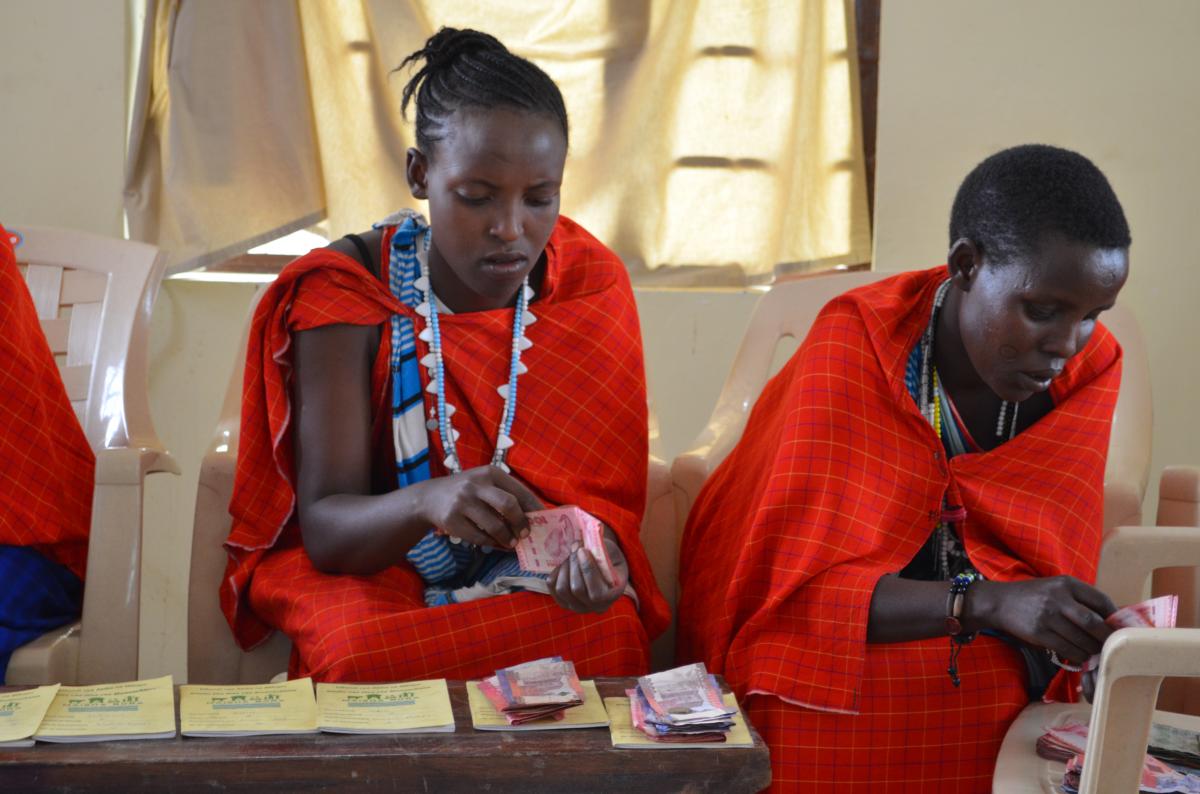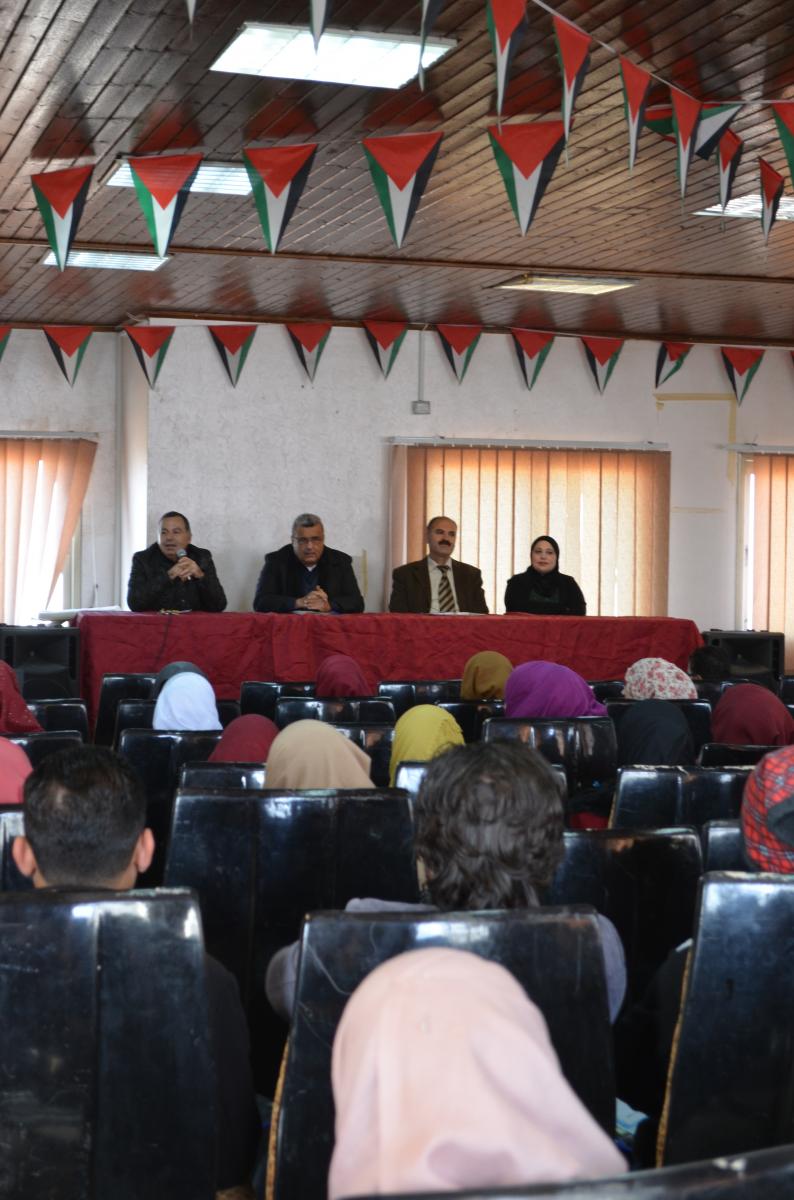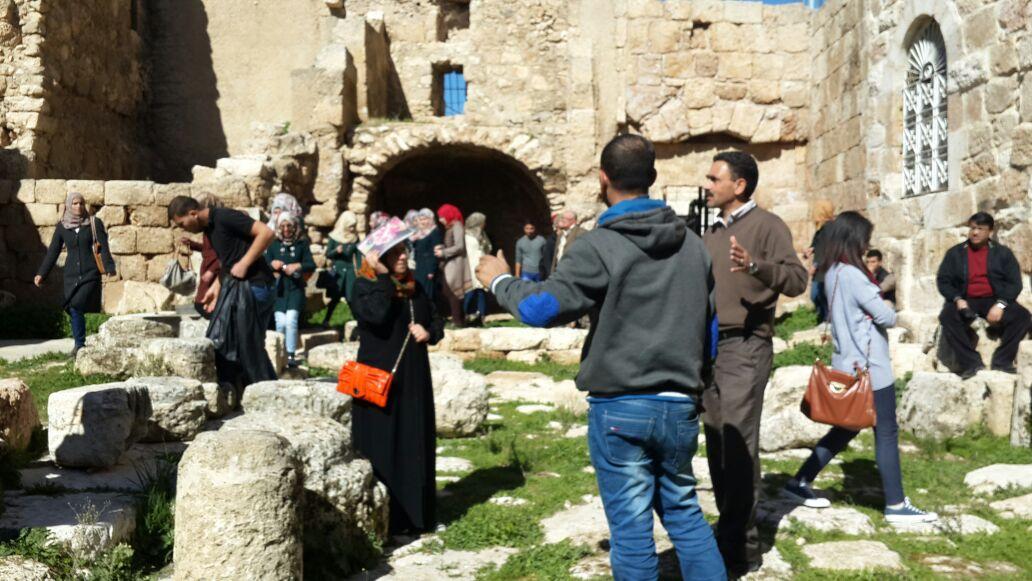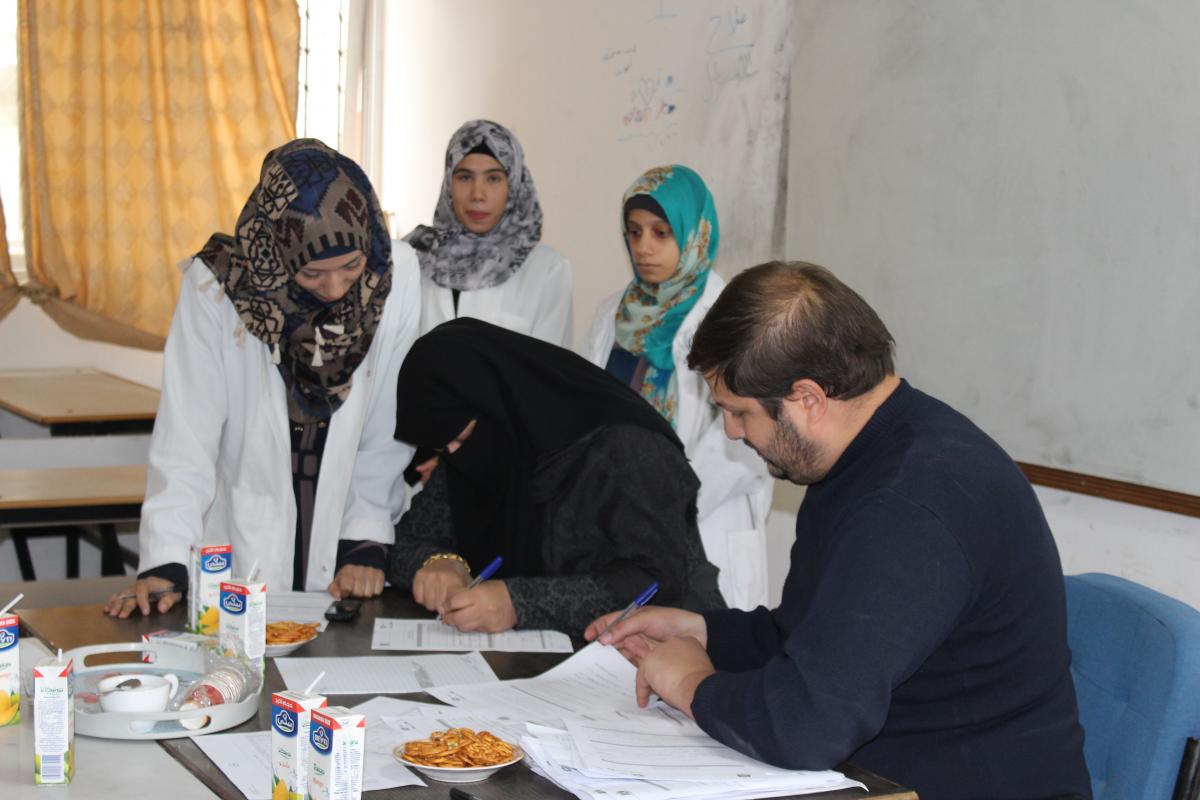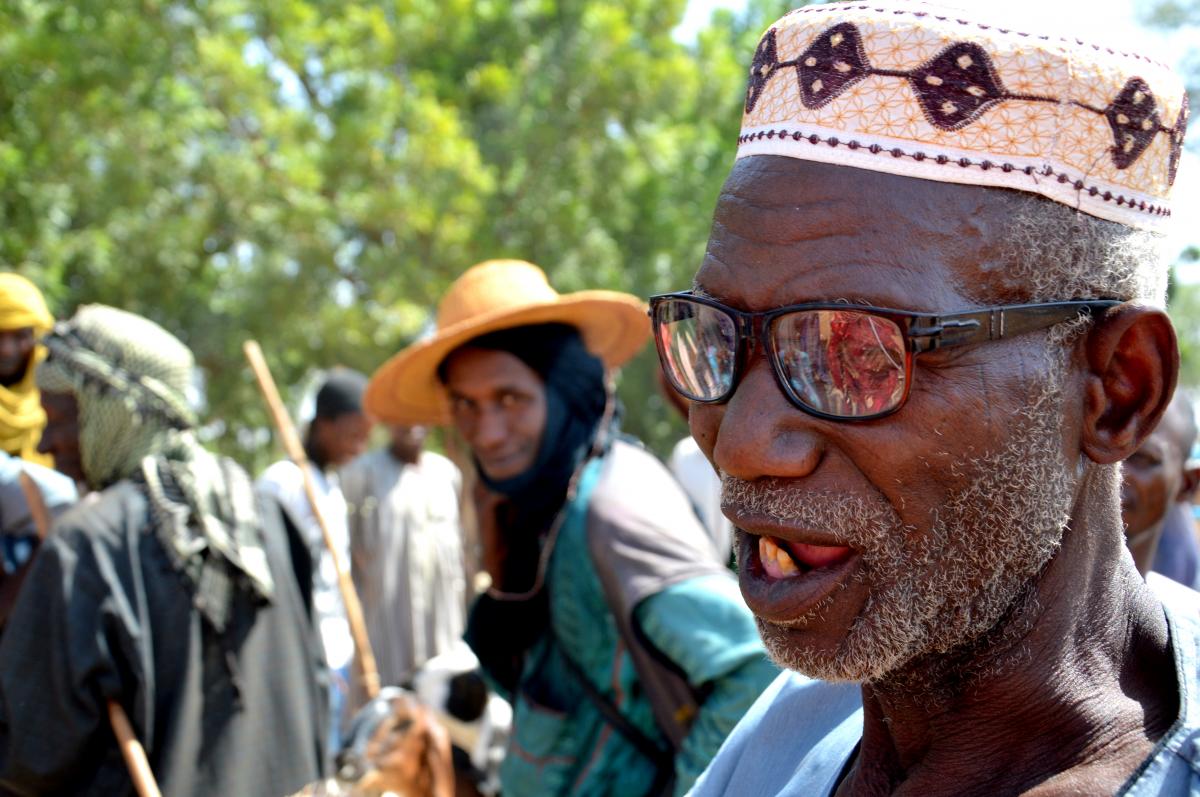Search
Viewing 2310 to 2325 of 2520 news
-
Focus on Business: Saving groups are sharing out
Toon DRIESEN | 19/12/2016
Saving groups are sharing outPicture: Sharing out of Ebeneza group in Orkejuloongishu. They accumulated 3,200,000 Tsh during their first cycle and generated a profit of around 20% (The price of a share was 500 Tsh and they received 603 Tsh per share during the share-out meeting). Trias and its local partners PWC, Mwedo and Mviwata Arusha have been training around 30 community trainers in 2016 in the VICOBA (Village Community Banks) methodology. Those trainers have trained 140 VICOBAs up to now (+- 3300 members, 80% female members). A VICOBA is a saving and credit group of people who save together and take small loans from those savings. The group activities run in cycles of around one year, after which the accumulated savings and the loan profits are shared out back to members according to the amount of savings of a member. The annual share-out resolves any outstanding issues and builds member confidence. It provides an instant verification to all members that their money has been safe and that the process is profitable. A healthy return on savings is between 5 and 25% per year. Since the first VICOBA trainings within Maisha Bora programme started last January, groups are now starting to share out. Some groups organize a big event with a celebration and a fundraiser. After the share-out, members who do not wish to continue may leave the group and new members may be invited to join. Our advice to the groups is that members who plan to continue to the next cycle will agree to use some of the shared out savings to make a contribution to the loan fund for the next cycle (starting capital). This means the groups do not start with an empty credit box in the next cycle and can give bigger loans faster. When a new cycle begins, members will conduct new elections for the committee, review their constitution and may make changes to the amount of social fund contributions, price of a share, interest rate etc. We look forward to follow-up on our groups in the next cycles!
-
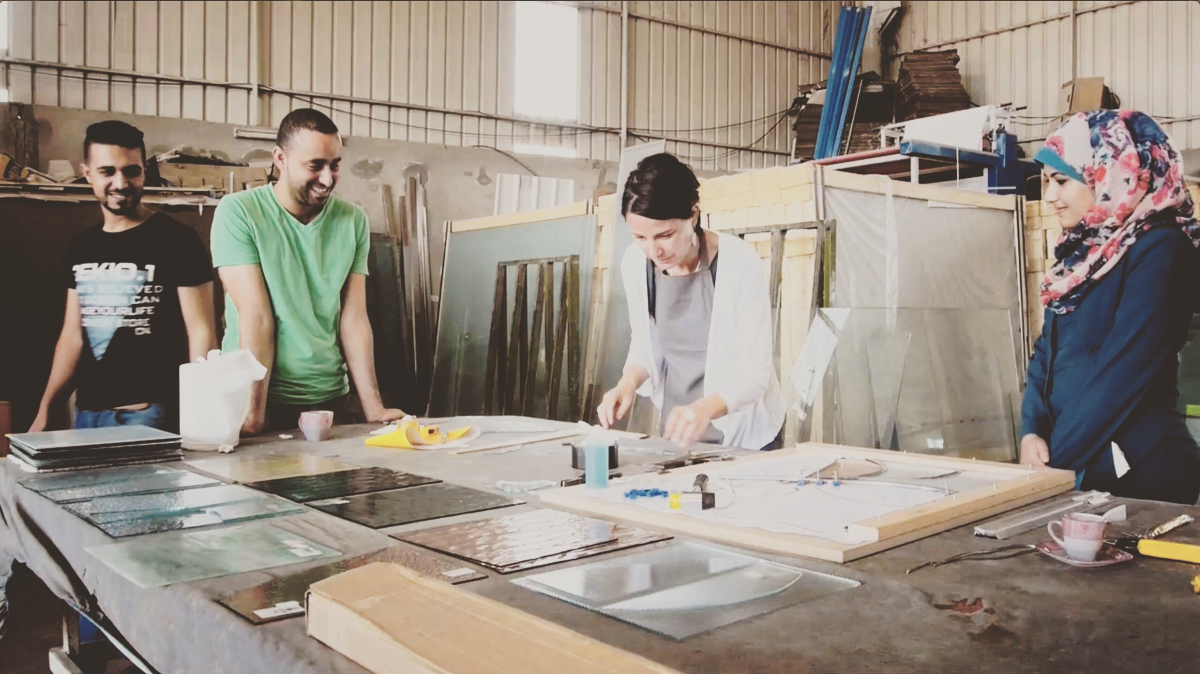
GLAZZA – Belgian Glass art comes to Gaza
Eva MORRE | 16/12/2016
In February 2016, Belgian glass artist Michèle Vanvlasselaer had the opportunity to visit Gaza for the first time and to present her work to the students of the University of Palestine. The trip to Gaza was a revelation and she returned buzzing with ideas. Inspired, Michèle decided to create, with a group of friends, a new initiative called GLAZZA: an association to support artistic and educational projects in the visual arts. The aim is to re-intoduce the art of stained glass windows into Gazan architecture and construction. After various other visits to Gaza, a successful workshop for children was organised together with UNRWA in the summer of 2016 as part of the Summer Fun Weeks. The results of this workshop have been shown to the public during an exhibition, first in Brussels, and early 2017 also in Gaza. During the summer, Michèle has also given a workshop on glass art during the TVET Summer Camps, organised by Islamic Relief Palestine, in cooperation with the Belgian Development Agency. The idea behind the summer camps is to try and change the negative attitude towards TVET in the Gaza Strip and increase the enrolment of TVET students, which is at the moment very low notwithstanding the high number of job opportinuties in this field. The summer camps gave the students of general education the chance to practice different technical vocations and understand better what TVET is all about. Michèle is now planning to take the lead in a course on glass windows at the University College of Applied Sciences (UCAS) in Gaza. She will train a team of students and artists to work together on stained glass windows for the private sector in Gaza. GLAZZA is also researching the possibility to export stained glass windows globally. This pilot course will target graduates in Interior Design and Arts and Crafts from UCAS who will be able to attend an intensive course in stained glass, lasting for six months. After this pilot project, the project will be evaluated, but the long-term aim is to develop a fully functioning independent training department focussing on the art and craftsmanship of stained glass windows in Gaza. For updates, a video about the project and more information, take a look at the website of GLAZZA: http://glazza.eu/glazza-in-gaza/
-

Amal’s big dream: a success story in Bethlehem
Eva MORRE | 16/12/2016
The big dream of Amal (28) was to study in order to open a Beauty salon and provide her family with a better living. However, she was never able to continue her education because her parents couldn’t afford it. Later on she got married and had three kids, but due to the illness of her partner and the fact that she needed to take care of the kids, she was still not able to continue studying. Finally, early this year, thanks to a scholarship programme from the Work Based Learning programme of the Belgian Development Agency (BTC) she was able to follow the Hairdressing and Beautification course in the Bethlehem Star Charitable Society. Together with 20 other people she was selected for the grant. Recently, she has opened her own Beauty salon. The other students who followed the same course as she did were also rather successful. In total, two more girls are now running their own salons, and almost 80% of the graduates are now employed in salons, or are working from home as a hairdresser. BTC has launched a Work Based Learning scheme that allows students of technical and vocational education and training (TVET) organizations to do an apprenticeship in the private sector as part of their studies. To facilitate the access of disadvantaged and vulnerable groups to this scheme, a matching Scholarship Fund was launched. This fund provides scholarships for underprivileged students who want to follow a training in the technical or vocational education and training sector, but would otherwise not have the means to cover tuition fees, transportation, insurance or other costs related to their training. The Work Based Learning programme has proven to be a huge success: more than 80% of students who graduate from the programme, find a job immediately after their studies.
-
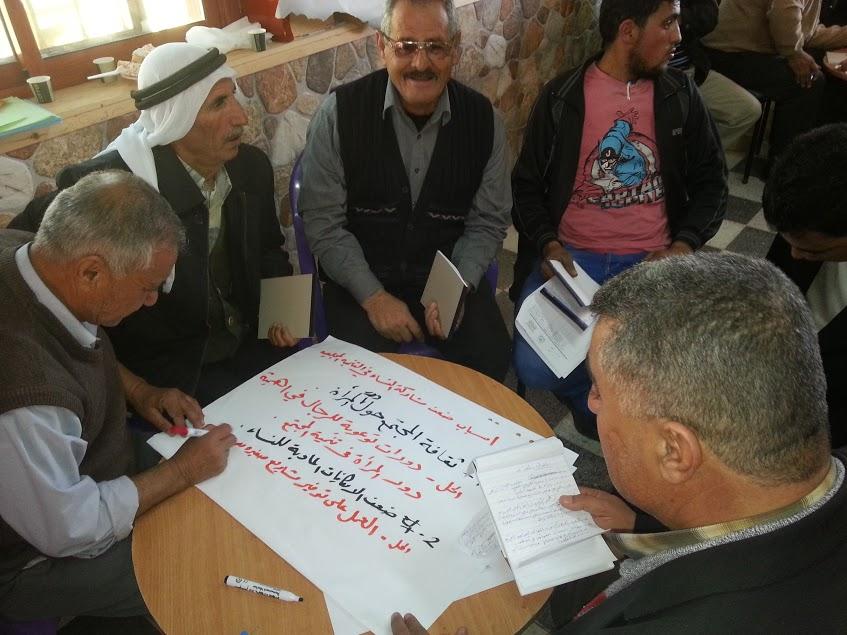
Communication as a tool for strengthening local governance
Eva MORRE | 14/12/2016
Villages and Municipalities are the oldest existing level of public authority in Palestine. They even have been, in some periods of the Palestinian history, the only operational level of administration. Villages are the main social anchorage of citizens and a true witness of the Palestinian culture and identity. Still it seems that citizens don’t always realize the importance and the role of Local Government Units in the Palestinian governance and administration system. The Palestinian Authority’s mission in the field of Local Governance is defined as “to promote capacity and efficiency of LGUs, enabling them to provide high quality and cost-effective services to citizens at the local level through phased decentralization. Local Government Units will be enabled to exercise their role, carry out assigned tasks and obtain entitlements in accordance with provisions of the law.” The Local Government Reform & Development Program, funded by the Belgian Government, is acting upon this mission statement by striving for small village clustering and inter-village collaboration, local economic development, territorial integration and policy making. To a smaller extent the program also focuses on community participation as the communication plans of the village clusters may be considered as a first step in this direction. Through communication, attention is given to awareness raising, creating citizenship[1], sharing a vision and community participation. Communication is a participatory process A healthy society can only be achieved through an effective and interactive communication. This means a two-way process in which information, knowledge and skills relevant for local government development are exchanged between stakeholders and community members. Indeed, local governance refers to a public action which is “concerted” through a strong participation and a close coordination of all stakeholders in designing, implementing and monitoring public policies and (development) projects. As such, communication is to be considered as a crucial and intrinsic tool in all governance processes and especially in a decentralized institutional framework. Communication allows to achieve different but complementary objectives and results: to inform citizens and raise their awareness on public issues which leads to understanding; to create a same vision which will boost cultural and socio-economic initiatives; and to organize participation (partnerships) amongst stakeholders to create citizenship and commitment. Communication is as such used for people’s participation and community mobilization, decision making and action, confidence building for awareness raising, sharing knowledge, and changing attitudes, behavior and lifestyle.[2] The role of LGUs in communicating towards creating citizenship When people of all ages, abilities, and socio-economic backgrounds can not only access and enjoy a place (cluster of villages), but also play a key role in its identity, creation and maintenance, only then we achieved sustainable and effective village clustering. An effective agglomeration process as such, capitalizes on local community’s assets, inspiration, and potential, and it results in the creation of a community that contributes to people’s health, happiness and well-being. The LGUs are the key actors in enabling a good environment for (local) development. They tackle political, social, economic and cultural matters in order to create a good living environment for the citizens. However, they cannot provide development by themselves: they need a strong dialogue with different members of the society; both shareholders – who strive for the same goals – and citizens – the beneficiaries – in order to address the communities’ needs. As such development is no longer a one-way matter (strived for by one single actor or agency), but is rather a dialogue between different partners, where all partners cooperate to achieve a shared vision and goal. In order to enhance the role of LGUs in implementing development projects in local communities, the partnership between the Joint Service Council (JSC), the private sector and community-based organizations should be strengthened. This cooperation will imply sustainable development and promote the principle of social responsibility taken by all actors. No communication without monitoring and evaluation Participatory communication articulates social change processes. As such, the evaluation should not focus purely on outputs, but rather on the satisfaction of the people. Furthermore, if participation means that stakeholders are partners in the entire process, it means they should also be involved in the monitoring and evaluation phase of a project.A participatory M&E is a social process which is not a set of techniques to get to know what you want to know, but is more importantly an opportunity for people to express their views, needs and expectations. Also in LGRDP we support an ‘appreciative’ M&E approach through which we want to ask the citizens to examine their present community and living environment, to appoint the assets of the cluster and the inter-village arrangements and to define their community for 2025. A participatory M&E is no longer a tick list, but becomes a true communication tool. Furthermore, this ‘positive’ approach results in making the community feel proud and positive about their community and their role in this community. The process also leads the community towards transparency, mutual trust, partnering and community institution building. As such, this participatory M&E not only monitors the project, but also enhances the communication, institution building and empowerment which are part of the outcomes of any development project, including LGRDP. In conclusion The idea of participatory communication has considerably gained attention in recent years. Many development agencies and other actors in the field believe that they have found in participatory communication the most appropriate concept to guide their work in the developing world. However it is a concept that is challenging to implement. Leadership and management are skills that are crucial. Proper application of participatory communication methods are not enough to ensure a project’s success as an enabling context (with stakeholders at local and national level having an enabling attitude) is as important. LGRDP wants to join the fray of participatory communication. The program supports the LGUs’ staff through concessive capacity building activities, in order to enable them to develop and implement a participatory communication strategy. So far, communication plans have been developed in a participatory way, but now, we want to go a step further. Revising the approach, together with the four communication officers of the targeted clusters, is a first step in the right direction. Conducting a participatory M&E of the program is a second. Both together will give us insight in how to optimize the communication strategies at LGU level and how to work together towards sustainable community development, including all outputs of the program; strong local governance, citizenship, territorial integration, etc. Communication in LGRDPIn an overall challenging socio-political context, local government is seen by the Palestinian Authority and the government of Belgium as a driving force for promoting both State building and local economic development. Since 2001, Belgium supports Palestine towards facilitating and strengthening collaboration between LGUs, with a particular focus on the smaller local Authorities, through the Local Government Reform and Development Program (LGRDP). LGU collaboration through Joint Service Councils is seen as the entry point for capacity building of LGUs to improve their service provision, promote local economic development and contribute to territorial integration. In a first phase LGRDP focused on infrastructural projects such as linking roads in order to physically link the different villages in one cluster. In a second phase also social infrastructural projects were implemented such as women centers, health clinics, etc. All these infrastructural projects enabled inter-village collaboration. But to ensure a good connection between the different communities of the clusters, social activities were essential. Therefore community participation was, since the early beginning of LGRDP – by now 6 years ago – acknowledged as a crucial aspect of LGU planning and development. A first approach was to contract an external consultant to develop the communication plans of the targeted clusters. Gradually, the approach shifted towards empowering and enabling the staff of the JSC to develop their own plans. Since 2014, LGRDP (financially) supports a communication officer in each of the clusters who is part of the JSC’s staff and fully responsible of all local communication, including the development of the yearly communication plans. Communication plans consist out of different communication activities that reflect an integrated view on the LG reform process. Moreover, also by inviting all community groups, community leaders and CBOs to participate in the development of the communication plan, the JSC encourages inclusion, sharing visions and general participation. Approximately every month a communication activity, such as “Planting trees”, “Cleaning Day”, “Ramadan Iftar”, is organized. [1] Citizenship means people think of themselves as active citizens, willing and able to have an influence in public life and their local communities. [2] M.O. Adedoku, C.W. Adeyemo and E.O. Olorunsda; The impact of communication on community development; Kamla-Raj, 2010
-
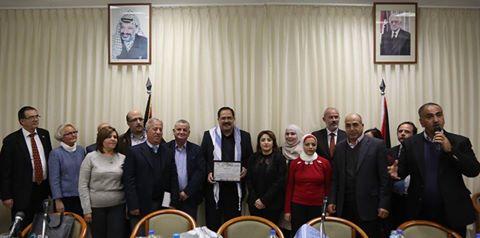
Belgium hands over co-chair to Finland during the Education Sector Working Group in Ramallah
Eva MORRE | 14/12/2016
Ramallah – On 12 December 2016 the last Education Sector Working Group of the year took place at the Ministry of Education and Higher Education. This meeting which gathers all education stakeholders in the Palestinian Territories, including officials of the MoEHE, national and international civil society, and development partners, takes place every three months at the MoEHE to discuss developments and challenges within the education sector in the Palestinian Territories. His Excellency, the Minister of Education and Higher Education Dr. Sabri Saidam, announced that the role of the co-chair of the ESWG, which is currently fulfilled by the Consulate General of Belgium, will be transferred to the Representation of Finland, as of 1st January 2017. His Excellency thanked the Belgian Delegation for their hard work for two and a half year. Mr. Bruno Jans, Consul General of Belgium, looked back at the many achievements of the education sector in the past two years, a sector that is seen as exemplary of the Sector Wide Approcach in the Palestinian Territories. He also stressed the continuation of collaboration with Belgium including through the Joint Financing Arrangement. Belgium will continue to play a pivotal role particularly in the areas of TVET, curriculum development, education in emergency, public finance management and digitalization, as well as in the Service Delivery Pillar on Education of the EU Joint Framework. During the Education Sector Working Group, key officials of the MoEHE presented the new framework of the Education Sector Strategy (2017-2022) and the Annual Work Plan and Budget for Financial Year 2017, followed by a group discussion with questions and answers. In her welcoming remarks at the meeting, Ms. Florence Duvieusart, Consul and Head of Development Cooperation at the Consulate General of Belgium commended the MoEHE for the hard work implemented in the sector under the dynamic leadership of the Minister, and in genuine partnership with Development Partners. She stressed the positive developments that took place in 2016 in the areas of Financial Management, Technical and Vocational Education & Training, Digitalisation, and Education in Emergency. She then acknowledged the need in 2017 to target investments in vulnerable areas like East Jerusalem, Gaza and Area C, and the need to enhance efforts to better coordinate development aid and humanitarian aid. She pledged continued support from international partners in these endeavours. In his welcoming remarks, UNESCO Representative to the Palestinian Territories, Dr. Lodovico Folin- Calabi, applauded the launch of the new National Policy Agenda and the achievements made in the education sector such as the introduction of the new Tawjihi system, TVET, curriculum reform and the developments made with early childhood education. Dr. Folin Calabi mentioned “these are big steps taken in a very short duration which will affect positively the learning outcomes of our children and help bridging the gap between the supply and demand in the Palestinian labour market”. At the end of the meeting, the Digitalization for Development Prize that the Palestinian Ministry of Education and Higher Education had won earlier this month in Belgium, was handed over to the Minister and the project team that had been responsible for the achievements.
-
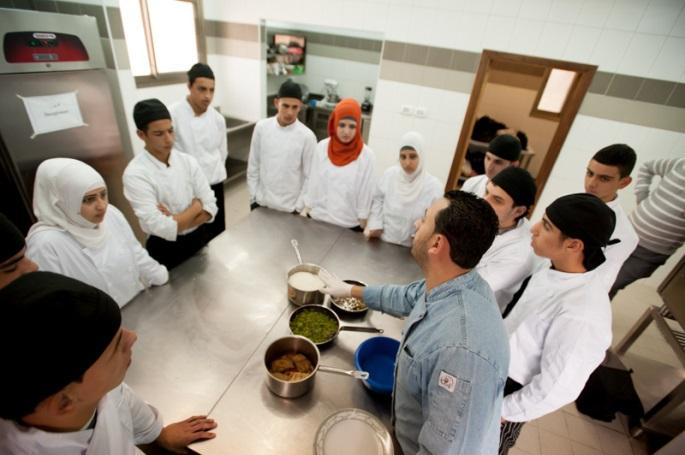
Flying High in Jerusalem
Eva MORRE | 08/12/2016
The Work Based Learning (WBL) scheme in which students combine a theoretical education in a technical or vocational institution with a practical internship in the private sector is already successfully implemented by BTC in various areas in the West Bank and Gaza. Last year, a first WBL-pilot project has taken place in the YMCA in East Jerusalem. More than 50 students have at that occasion completed a WBL course in Office Management. After this successful pilot project, more WBL initiatives are now coming to East Jerusalem, through joint projects between GIZ and BTC. One of these projects “Fly High” has been launched on November the 30th. It focusses on the tourism sector and will be implemented by Juhoud, in collaboration with Notre Dame of Jerusalem Hotel & Center and the Arab Hotels Association (AHA). The primary aim of the project is to bridge the gap between the technical and vocational education and training system (TVET) and the private sector. As the main source of economic development in East Jerusalem is the tourism and services sector, this pilot project will be limited to this sector. The Fly High project aims to: Build a strong and reliable consortium of Palestinian NGOs and Private Sector Organizations to provide training and employment services in E-JerusalemEstablish a multi-purpose employment service “One Stop Shop (OSS)” in E-Jerusalem and provide a continues employment serviceImprove the Technical and Life Competences of 200 youth (gender sensitive) in the field of Tourism and Services Engage 100 youth who received the training with the Work Base Learning program for 2 monthsOpen windows to 70-80 youth (Gender Sensitive) to achieve their aspiration (fly-high) by finding a decent work A second initiative in cooperation with the Palestine Education for Employment (PEFE) organisation has just started as well. In this project, PEFE will train 75 unemployed, underprivileged youth. Half of them graduated as a nurse, while the other half is a graduate in hospitality studies. Thanks to the WBL initiative, they will have training opportunities in cooperation with the Arab Hotels Association – for the hospitality students – and the Hospitals association – for the nurses.
-
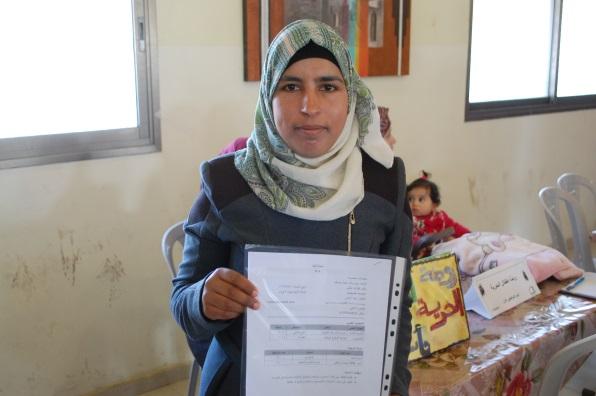
Impressions of the Job Fair in the cluster in South East Nablus
Eva MORRE | 08/12/2016
The joint service council of South East Nablus represents four villages: Beita, Osarin, Odala and Za’atara. Through the joint service council (JSC) these villages strive to be able to give better services to their citizens. One of the major challenges in the region is the high youth unemployment, that exceeds 40%. In order to help their youth to find a first job opportunity, the JSC has organised a job fair. In total more than 120 students and 30 different companies have participated in the first job fair organised by the Joint Service Council of South East Nablus. We have collected some impressions of participants of the job fair.Rawan, 23 years old, is a graduate from Al Najah University in Nablus where she studied economic development. Currently she is looking for her first job. She attended the training on how to apply for a job, organised by the Joint Service Council of South East Nablus, in cooperation with the Local Economic Development project of the Belgian Development Agency (BTC), the Ministry of Labor (MoL) and An Najah University (ANU). During that training, she learnt how to conduct a job interview, and had tips and tricks on how best to develop her CV. One of the companies present at the job fair is Fatin. This non-profit organisation began as a project of Save the Children, but has since established itself as an autonomous organisation with more than 40 branches spread out in the West Bank and the Gaza Strip. It mainly focuses on micro-projects for women and special start-up programs for students. In case young people have a good start-up idea, they can support them with a start-up fund and some expertise. Fatin is currently looking for two positions, one as an administrative assistant and one accountant for its projects, based in Huwara. They hope to find suitable graduates during this job fair. Wasef Moa’alla, the mayor of the Joint Service Council was also present during the job fair, and was very happy with the outcome. He stressed the importance of having a good relationship between the Joint Service Council and the private sector. They need to work together more closely in the future to make sure that the citizens of the cluster will have more job opportunities. “This day is a good opportunity to improve the relationship between the Joint Service Council of South East Nablus and the private sector. “ Pioneer is a company specialised in making elevators and escalators. It was founded as a start-up four months ago, and is now working together with a sister company. They are looking for 3 people to strengthen their team: 2 engineers and one manager. They enrolled in the job fair thanks to the Facebook post of the Joint Service Council, inviting private companies of the region to join in the job fair.
-
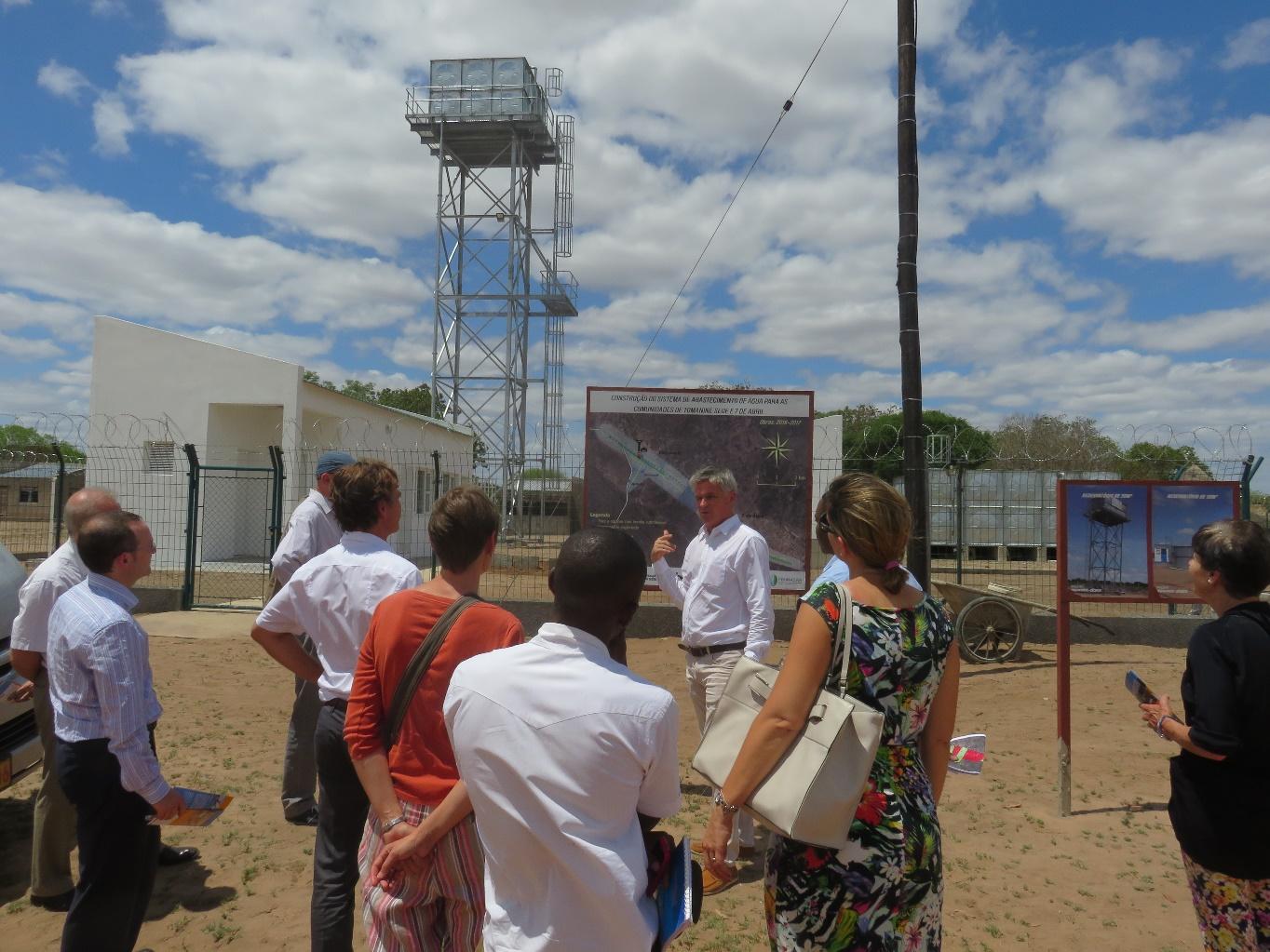
EU Heads of Missions visit to BTC Water Supply Project
Matilde PINAMONTI | 06/12/2016
During the EU joint mission to Gaza and Inhambane provinces, Mozambique, eight European Heads of Mission from Belgium, Finland, France, Germany, Spain, the UK and the EU visited the Tomanine pumping station, built within the framework of BTC Water Supply and Sanitation project.When the BTC first visited the communities of 7 de Abril and Tomanine, the 9000+ residents of the area only had access to water through 17 manual pumps. However, due to the saltiness of the groundwater in the area, the majority of it was not safe to drink. Therefore, the project decided to upgrade the existing water infrastructures and at the same time improve the access to drinkable water by constructing a new water plant and network. The project focuses on easy distribution of drinkable water: by installing the water systems on multiple locations in the communities and in proximity to the houses, access to water is made easy for the residents, and the systems are easier to maintain. In general, the quality of water is greatly improved, and drinkable water is now accessible 24/7. In addition, the project established a private/public partnership to maintain the system. When the project will be completed in 2017, the easy access to drinkable water will improve the quality of life of the around 9000 residents and will reduce health problems related to drinking saline water. Key data Location: Tomanine - 7 de Abril, Gaza Province Budget: 600 000 Euro Number of beneficiaries: +/- 9000 Estimated date of completion: April 2017
-
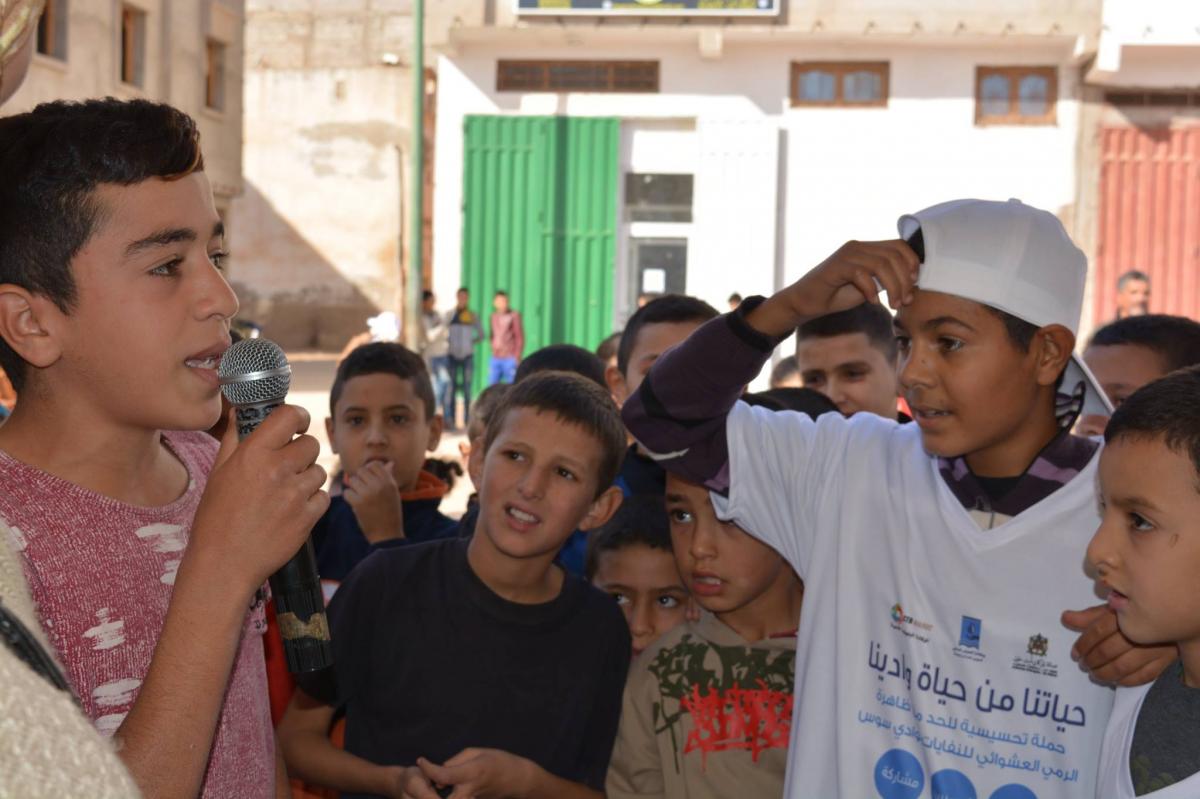
Notre vie est notre rivière
Meriem HILALI | 06/12/2016
« Notre vie dépend de celle de notre rivière » : tel fut le thème fédérateur de ces quatre jours de sensibilisation, sur quatre points d’animation tout au long de l’Oued Souss au sud du Maroc. Une caravane de l’eau organisée par l’Agence du Bassin Hydraulique de Souss Massa, en collaboration avec la Préfecture d’Inezgane-Ait Melloul et en partenariat avec la CTB Maroc. L'objectif de cette compagne est de Sensibiliser les populations riveraines pour mettre fin aux dépôts clandestins des déchets et rétablir l’équilibre naturel d'un éco-système fragilisé. Au programme tente pédagogique, jeux et animation pour les enfants, distribution de casquettes et t-shirt aux couleurs de la campagne.
-
Joint Service Council of South East Nablus organizes first Career Day targeting rural areas
Eva MORRE | 05/12/2016
During the first week of December, the Joint Service Council (JSC) of South East Nablus, with the support of the Belgian Development Agency, has for the first time organized a job training, followed by a job fair. During the training, fresh graduates learn how to write a good and original Curriculum Vitae (CV) that stands out, how to present themselves and how to have a good job interview. The training consists not only of lectures, but also of different interactive exercises where the attendees are given tips and tricks. More than 60 graduates (about 20 boys and 40 girls) participated in the training sessions. For some it was the first time they attended such a training, others already had similar training at university. However, it was the first time a training day like this was organized by a JSC. The training and Job Fair specifically target fresh graduates from the organizing cluster, but also graduates from neighboring villages are welcome. Jumana, Moatasin and Housam are three fresh graduates of the cluster that attended the training. Their hopes for the training were to improve their knowledge and skills in order to be more confident to approach the labor market. They also hope to encounter interesting companies or institutions – who are willing to give them their first job – during the Job Fair on 7th of December. “I am very pleased with the effort done by the JSC to organize these events because, until now, these job fairs were only organized in the big cities, not in the rural areas”. Jumana – participant in the job training The mayor of the JSC confirms it is a very important event: “It is one of the most important events organized by the JSC because it will help to improve the local economy. It is a moment to meet the fresh graduates from the cluster and give them a voice to address the labor market. The Job Fair enables networking between the fresh graduates and the labor market. We give the opportunity for fresh graduates to find a job but we also give the companies and institutions the opportunity to find new and very motivated employees.” More than 30 companies, including several banks, hotels & resorts, and IT, insurance and engineering companies already confirmed their presence at the Job Fair.
-
Key aspects of a sustainable regeneration process
Eva MORRE | 05/12/2016
All over the world, people are migrating from the rural areas towards the cities. Economic reasons are often the base for this migration, but the city also attracts people for its social and cultural life. Also in Palestine people move out from the rural areas towards the bigger cities, leaving the often historic valuable centers abandoned. Most residents still living in the historic centers are poor. They are often tenants, perceived by the general public as those who don’t have the means to move to modern cities or urban extensions, reinforcing the idea that historic centers and people living in them are backward. The Regeneration of Historic Centers (RHC) program aims to change this perception and to bring life back to these historic centers by focusing on their social, cultural and economic development. Four key aspects distinguish the approach of the RHC program from other rehabilitation programs. The regeneration program goes beyond rehabilitation. Reviving, revitalizing, regenerating the historic centers needs more than stones and mortar. It is not by rehabilitating the historic buildings that people will be attracted to live or visit the historic center. When looking for a place to live, people are looking for affordable housing, job opportunities, social interaction, good public services, etc. A regeneration project takes into account all of those dimensions. Regeneration needs people. The presence of people (inhabitants) is crucial for an effective regeneration. Without people to use the rehabilitated spaces (buildings and open spaces), each and every regeneration project is doomed to fail. A good balance between the rehabilitation of historic buildings for socio-cultural or socio-economic use and the rehabilitation for housing purposes is as such fundamental. Regeneration projects don’t follow a linear trace, but are rather a multi-actor and multi-dimensional process that are characterized by having different linked processes running in parallel. While processes at the national level initiate policy making processes and encourage the development of laws and by-laws, processes at the local level focus on capacity building of the municipal staff to strengthen their heritage management skills. At the same time, participation from the community is ensured through community envisioning, memory mapping, community activation initiatives, etc. at different stages of the program. Meanwhile, socio-economic, spatial, and architectural analysis, pre-feasibility studies and business models are prepared to serve as a base for the rehabilitation designs. In a final stage, rehabilitation projects are designed and implemented. And finally, the program goes beyond the regeneration itself. Even after the functions are in place, the RHC program continues. The operators of the newly rehabilitated buildings are supported through on-job training, IT support and capacity training on marketing while local and national staff are continuously supported to fulfill their role and responsibilities.
-
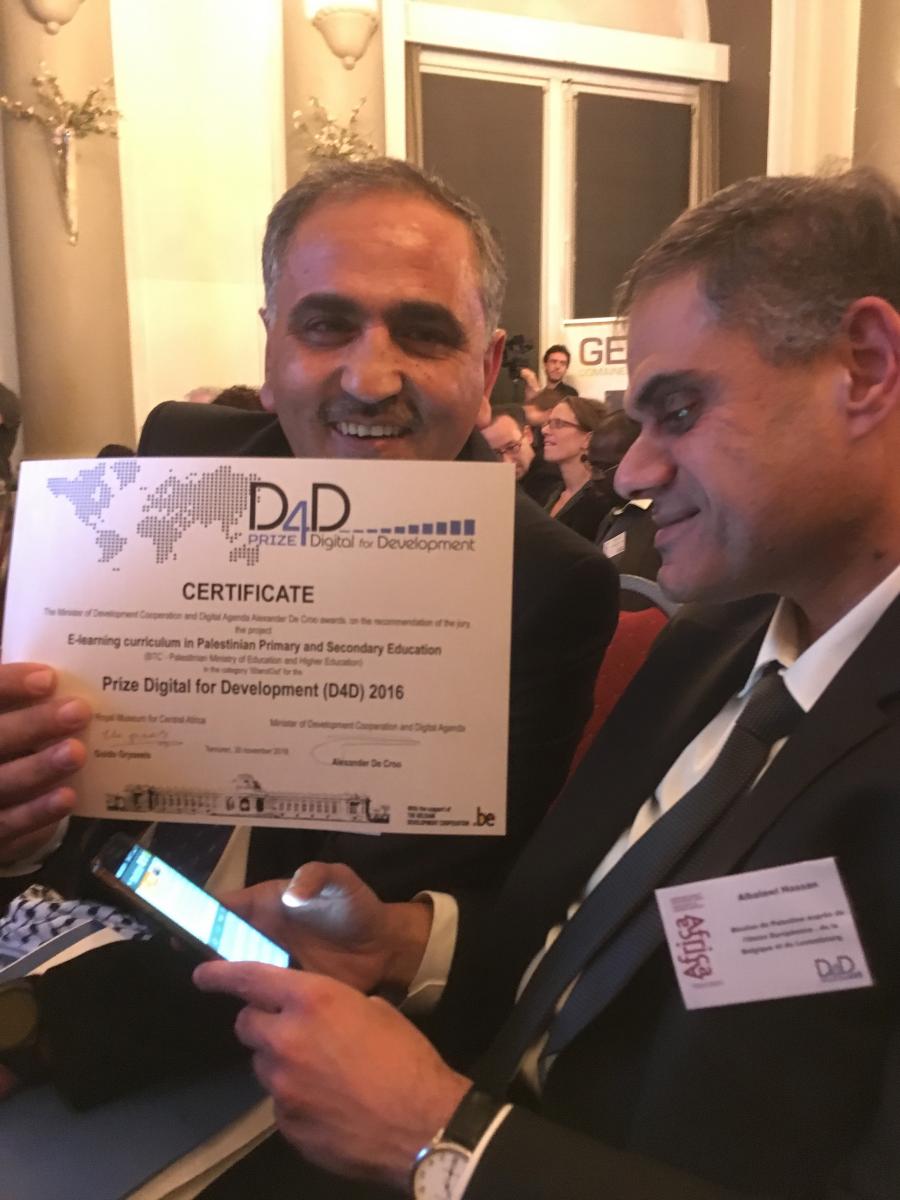
Palestinian e-learning project wins Belgian digitalisation prize
Eva MORRE | 01/12/2016
The Palestinian-Belgian project ‘e-learning curriculum in Palestinian Primary and Secondary Education’ has been rewarded with the Digitalisation for Development prize in Belgium. From 2011 until 2015, the Palestinian Ministry of Education and Higher Education (MoEHE) and the Belgian Development Agency (BTC) have jointly implemented the e-learning project to introduce the use of ICT in education to enhance student centered learning. The 4 million euro project was funded by Belgium and Palestine. After the official end of the project, the efforts have been continued and scaled up by the Ministry of Education. The project has introduced the use of ICT in 288 pilot schools in the West Bank and allowed the students to acquire 21st century skills. Thanks to this project, the focus has shifted away from mere technological solutions towards the use of ICT as an enabler for student-centered learning. The project has focused on 4 main pillars. First of all, the 288 pilot schools that were involved defined their own ICT-needs and were accordingly provided with ICT material. Furthermore, over 14.000 teachers have been trained on student-centered learning through the use of ICT. A digital teacher portal where teachers can share their learning objects with each other has been launched in 2015 and has already more than 2 million hits. And finally, the project was also a source for policy advice concerning the digitalisation policy in Palestine. The success of this project was already known in Palestine, but has now also been recognised worldwide, as the e-learning project has won the Digitalisation for Development (D4D) prize in Belgium, in the category ‘IStandOut’. The Prize ‘Digital for Development’ is a new initiative of the Royal Museum of Central Africa. The prize focuses on digital creativity and innovation in the Belgian development cooperation. The IStandOut category focusses on highlighting success stories and best practices in the field of ‘Digital for Development’. The award ceremony has taken place on the 30th of November and Dr. Basri Saleh, Deputy Minister of Education is now in Belgium to receive the prize.
-
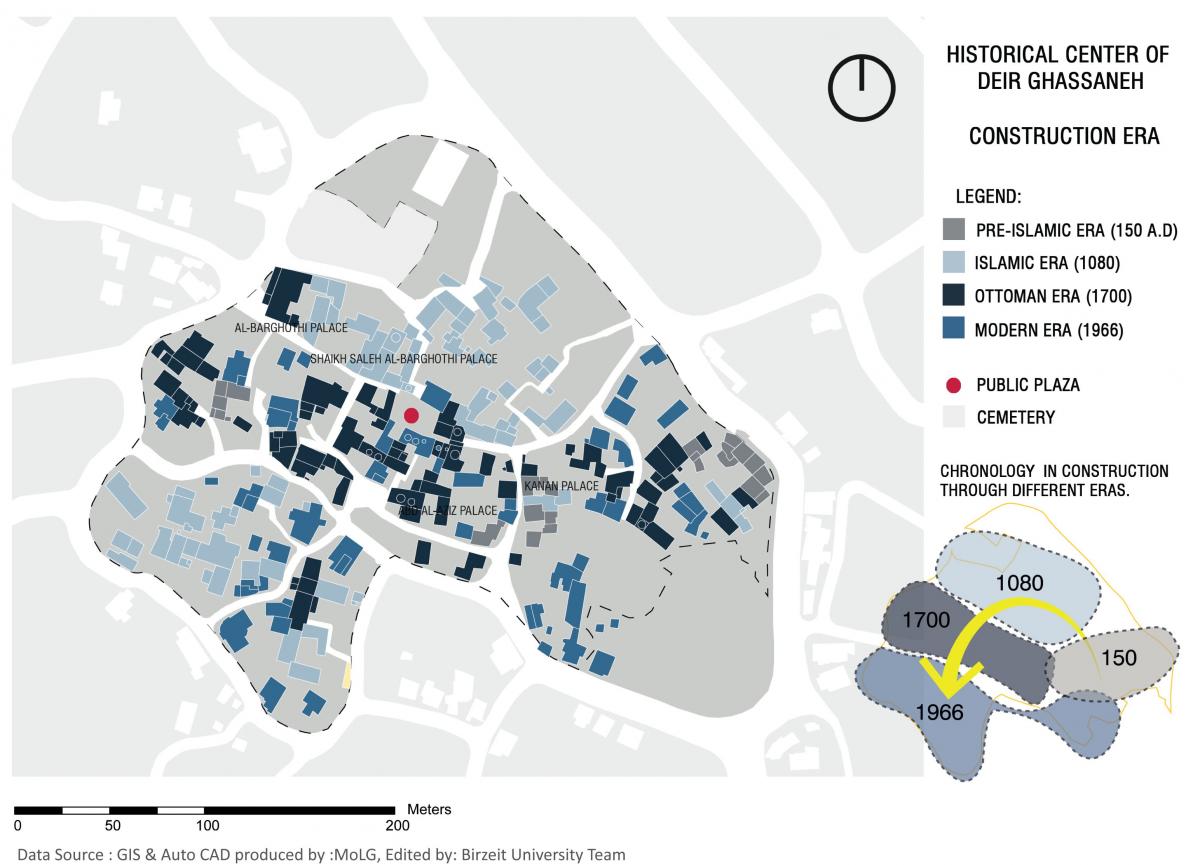
Inventory of the Palestinian heritage
Eva MORRE | 01/12/2016
People have always felt the need to refer to their history to identify themselves. Heritage is as such a collective property which tells us this history; the history of people, cities and territories. Heritage is a witness of our common identity, but also makes it possible for communities to show their uniqueness to the world. As such, heritage makes it possible for the present generation to understand their history and give a meaning to their current life, but also to get an insight in the history and life of others. Modernization, inevitable in every society, should therefore not overshadow the importance of heritage as it is a vector of development and social stability, both for present and future generations.[1] By preserving the heritage, one preserves a collective memory and identity. To valorize the heritage means to contribute to a better mutual understanding among communities and as such to more recognition and respect for the differences in the cultural identity. Preservation and restoration of cultural heritage is therefore one of the crucial dimensions of state- and nation building. After all, heritage is not only a reflection of identity, but also a powerful instrument in the economic and territorial development of a community. When properly valorized and promoted, cultural heritage could play an important role in tourism and tourism related activities. Tourism is a potential source of many types of financial gain. One can think of museum tickets, guided tours and visits, sale of handcrafts and photos, but also of the hospitality industry, transportation and restaurant services. Moreover, tourism is also a potential revenue for local governments through taxes. As such, cultural heritage can be a catalyst for tourism and the development of a city, region or country in general. Therefore, national and local governments have a major role to play in the protection of heritage. But choices need to be made as it would be vain to aspire to preserve everything. Furthermore, preservation cannot exist without development as otherwise it would lead to mummification. The question however remains; which elements deserve more than others to be preserved and to which level should the preservation be carried out? The identification and inventorying of cultural heritage is a first and fundamental step for gaining a general idea of the richness and diversity of the cultural heritage in a city or territory.[2] The scope of an inventory is to document the cultural heritage and make this documentation accessible to all; national and local authorities, policy makers, other stakeholders and the general public. Heritage inventories are an important tool for decision makers to formulate an appropriate strategy for cultural heritage conservation and management in urban contexts but could also be used to inform and sensitize the general public about the assets of cultural heritage. An inventory typically includes a wide range of information on a building, site or open space such as location, boundary, physical features, function, condition, architectural description, historic evolution, and identification of values contributing to the cultural significance. However, each inventory should be tailor-made to the researched area, it should reflect and add information to previous inventories and pave the way to get the predefined information necessary to make decisions on the management, development or conservation of the heritage. The case of the Palestinian Territory The Palestinian Territory has a rich history which can be witnessed through a lot of historic sites, landscapes, archaeological remnants, vernacular buildings and compounds, etc. However, for various reasons, the value of this heritage has not always been recognized. The historic sites and areas are often abandoned due to a lack of interest; urbanization processes that do not consider traditional structures; and Palestinian laws for the protection of historic buildings that are ineffective. Most residents living in these areas are poor. They are often tenants, perceived as those who don’t have the means to move to modern cities or urban extensions, reinforcing the idea that historic centers and people living in them are backward. Due to lots of reasons a vast amount of heritage has already been lost and the still remaining heritage is threatened – and therefore decaying – by natural forces (wind, rain, vegetation, etc.). It is common that the preservation of historic centers, the protection of heritage and the valorization of traditions are seen as a barrier against the modernization and improvement of living conditions. Most people today don’t want to live in houses made out of mud, stone or wood, but rather aspire to live in the concrete and steel residences provided in the cities. It should be the goal of all stakeholders in the heritage-field to change the sometimes negative perception with regards to ancient structures and to show the people the possibilities to adapt historic buildings to the needs and requirements of today and tomorrow, with respect for the historic values and local identity. In light of this, Belgium and the Palestinian Authority through the Ministry of Local Government (MoLG) have agreed upon cooperating within the project called ‘Regeneration of Historic Centers’ (RHC) which aims at revitalizing Palestinian historic centers. The program supports the regeneration planning, practice and policy development in the Palestinian Territory and has three main result areas:Regeneration forms an integrated element of Municipal planning in targeted Local Government Clusters;The socio-economic regeneration of targeted historic centers is enhanced using a multi-dimensional approach; and Lessons learnt from the RHC project contribute to the evidence based policy framework and planning strategies for the Palestinian National Authority. The update of the existing inventory, which dates back to the period 1999-2003 and was done by Riwaq is needed and is above all one of the activities that will contribute to the first result of the program. In order to develop the inventory a consultant (Mr. Corrado Minervini) was hired to develop the data framework and manual for the building construction assessment and inventory. Complementary with an effective inventorying tool, which provides the analysis of Historic Buildings in view of rehabilitation, a quick survey method was proposed in order to get an overall picture of the Historic Centers’ location, condition and value in the Palestinian territory. Together with the consultant 3 successive stages were taken: the information retrieval phase where all existing data is collected, the inventory fieldwork and on-site investigation phase, and finally the recording of the collected data phase where collected data is entered into a GIS system in order to make the data available and readable for all. Moreover, in order to make the Ministry staff and the engineers of the targeted localities of the RHC program aware of the purpose of an inventory, and how to use it for decision making, several workshops and training activities were conducted. But what’s next? Documenting and inventorying the valuable heritage of a territory is only the first step in the right direction. After defining and documenting the heritage worth to be protected, a regulatory framework, including protective measures, needs to be set up to safeguard this valuable heritage. The integration of heritage in the development strategies and the creation of adapted and applicable regulatory tools and policies are essential for a sustainable management of heritage sites. These policies should be prepared based on urban and territorial planning documents, regional development schemes and local development plans. While the State remains in charge of protecting the national heritage through different policies, efficient protection and preservation cannot be accomplished without the establishment of operative partnerships at local level. As decentralization policies and processes continue to evolve (see the LGRDP program of BTC in the Palestinian Territory), the Local Authorities will increasingly have a greater role to play in the protection and management of the local cultural heritage. Communities are for example already responsible for issuing building permits for new constructions or building renovations and should be aware that these activities have a strong and lasting impact on the local heritage.[3] However, very often municipalities do not have any skilled personnel in the field. Therefore it is crucial to strengthen the capacities of the staff of Local Government Units. This can be done through training, but also trough the establishment of strong alliances between government Ministries, National or professional institutions for Heritage Conservation (such as in the Palestinian case; Riwaq, CCHP, Welfare Association and Hebron Committee) and the local governments. And finally, management tools should be developed as not only the conservation of heritage should be encouraged, but more importantly the regeneration and revitalization of historic sites should be aimed for. Only by protecting, regenerating and sustainably managing a historic site, heritage can be integrated and play its socio-economic role into the existing urban fabric. [1] Cultural heritage and Local Development, A Guide for African Local Governments; UNESCO; 2006. [2] Cultural heritage and Local Development, A Guide for African Local Governments; UNESCO; 2006. [3] Cultural heritage and Local Development, A Guide for African Local Governments; p. 51; UNESCO; 2006.
-
Beautification: a Work Based Learning Success Story
Eva MORRE | 01/12/2016
Since she was in 5th grade Ghada (seated) has always dreamed of opening her own beauty salon. In 1994, she successfully graduated from the Vocational Training Centre (VTC) in Khanyounis in the Gaza Strip. Now, 12 years later, she is the owner of 2 beauty salons with a total of 14 employees. She is eager to further expand the two salons, and to attract more skilled employees. Therefore, she is now enrolled in the Work Based Learning programme of her former training institution in Khanyounis. Since this year, the VTC works closely together with the private sector to give their beautification students an internship period in the private sector during their studies. This cooperation allows the students to acquire more practical skills in the private sector and to be better positioned to find a job afterwards. The advantages of this system for the private sector are that they receive trainees who already have theoretical skills, and who might, once graduated also become employees. “I would like to further expand my beauty salons, but it is not easy to find skilled employees. Therefore, I enrolled in the Work Based Learning scheme” - Ghada Ghada will accept 4 students from the VTC as trainees. In the beginning she will just cover their food expenses, but once they become more productive, they will receive a proper salary. Also the tasks the students will execute will gradually become more difficult, and will depend on the progress and motivation of the students themselves. After the end of the training period, she will hire all students that meet the requirements and have obtained the skills to become good employees.
-
Un impôt sur le bétail? Pas bête du tout!
Stephanie EECKMAN | 30/11/2016
Le troupeau est aux éleveurs nigériens ce qu'un compte en banque est à la plupart d'entre nous. Il faut en prendre soin. Parmi les nombreuses mesures de soutien proposées aux éleveurs du Sahel nigérien, la CTB finance des programmes de vaccination du bétail et des points de vente sous le contrôle des communes. A 150 km à l'est de la capitale Niamey, le marché de Gouala est le plus important de la commune de Kiéché. Chaque mercredi, toutes sortes de marchandises s’échangent du matin au soir dans une ambiance joyeuse et poussiéreuse. Mais tandis que les commerçants présentent leurs produits sur des étals bien alignés, le business du bétail se faisait dans une belle anarchie. Impossible d’en contrôler les échanges. Il y a deux ans, la mairie de Kiéché a donc décidé de faire le ménage dans le marché. Grâce à l’appui de la CTB, elle a réussi à construire deux marchés de bétail à Gouala. Un parc à petits ruminants – moutons et chèvres – où l’entrée est fixée à 50 FCFA par tête et à 200 FCFA par vente, et un parc à gros ruminants – bovins et camélidés – qui engrange des montants plus importants, car la valeur d’une vache est bien supérieure à celle d’une chèvre. Ces marchés ont connu un succès immédiat qui permet non seulement d’optimiser les échanges entre acheteurs et vendeurs. «On s’est levé à Kiéché, » nous confirme Boubacar China, président du comité de gestion du marché de bétail à Gouala. « C’est vrai que notre système de taxation nous permet d’investir davantage dans le développement de notre commune, mais il ne faut pas oublier que nous avons surtout institué ce marché pour éviter les plaintes entre les populations, » explique-t-il. Il relate que pour chaque animal vendu, le comité établit un ticket de vente. Sur ce ticket, qui constitue la carte d’assurance contre les tracasseries, sont mentionnés le nom du vendeur, les caractéristiques extérieures de l’animal et toutes les indications permettant d’identifier l’animal et de disculper, le cas échéant, son propriétaire. « Et comme ça, il n’y a plus d’accusations de vol ni d’autres chamailleries, » nous dit-il. « Toutes les transactions sont désormais bien documentées. » Pas de développement durable sans coût Mais les marchés de bétail permettent bien sûr aussi d’alimenter les caisses communales. Les bénéfices ainsi engrangés permettent de financer une partie du Plan de Développement Communal dont Kiéché s’est doté. Un apport bienvenu, quand on sait que depuis la réforme gouvernementale de 2002 prônant la décentralisation, les communes du Niger doivent faire face à davantage de responsabilités. Cependant, le pouvoir central ne met guère à la disposition des communes les moyens financiers dont elles ont besoin pour mettre en œuvre cette réforme. Comme elles ne peuvent pas compter sur l’aide de l’Etat central, les communes - tout comme celle de Kiéché - font preuve d'initiatives et de créativité pour disposer des fonds nécessaires afin d'améliorer durablement le bien-être de leurs administrés. En donnant un coup de pouce simple mais concret à aux communes de la région de Dosso, la CTB initie un processus irrémédiable.
